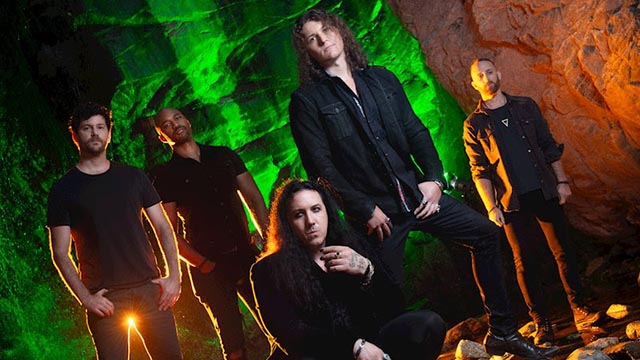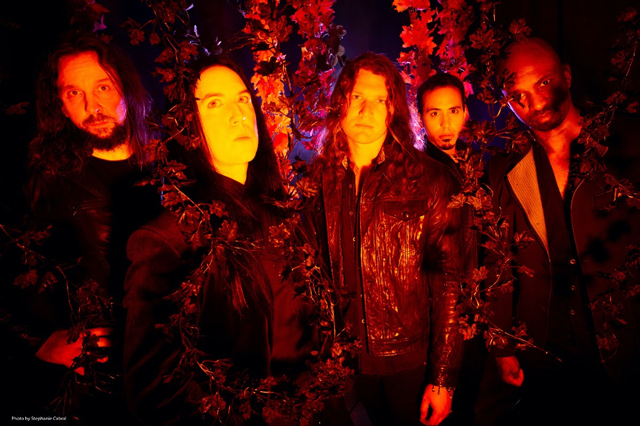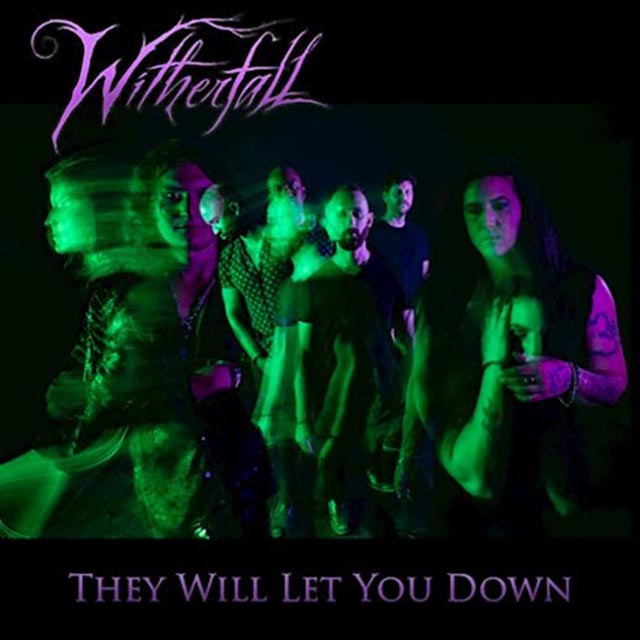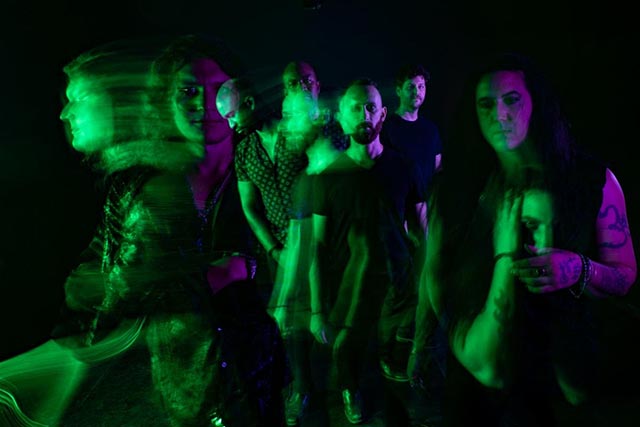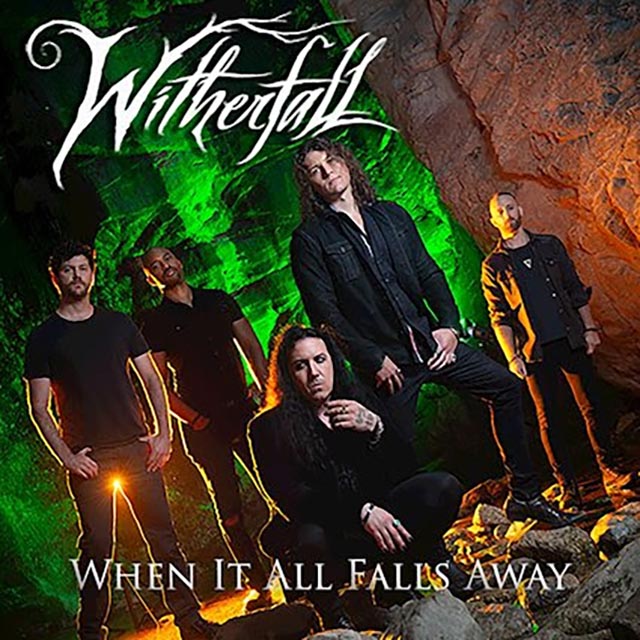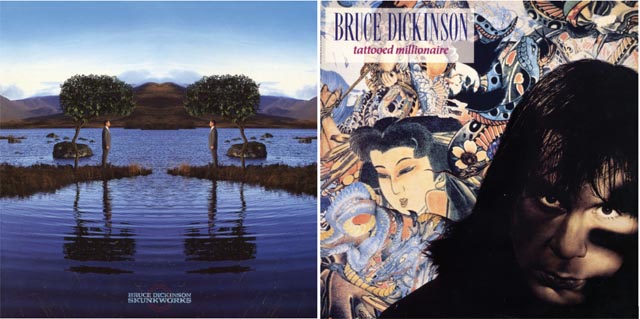Dark melodic masters Witherfall have crafted one of their strongest albums to date with Sounds of the Forgotten, released on May 31st via their own label, DeathWave Records. The band took drastic measures to ensure quality, from creating compelling videos to a lengthy recording process, embracing a creative freedom without boundaries or restrictions. This approach, rare in today’s industry, is a refreshing form of expression.
However, the album also arrives in a post-pandemic world with new challenges, including the frustrations of the streaming era and uncertainties about the music industry’s future. To fully bring their vision to life, the band ventured into dark and cold places for inspiration, both physically and metaphorically. Metal Insider spoke with Joseph Michael (vocals) and Jake Dreyer (guitar) in an in-depth discussion on the album, their break from labels, and more.
Let’s start with how you guys left Century Media and formed DeathWave Records?
Joseph: Well, we were independent when we started. We released Nocturnes of Requiems on our own. When Century Media first offered us a deal, we thought we’d take a shot and see what they could do for us. We really liked the team over there in Germany, but it didn’t work out. It didn’t make sense to stay with Century Media with the amount of work we still had to do and the amount of money, the percentages they were taking, what they were doing for us didn’t really lend itself to what they were taking in return.
Curse of Autumn, seems to be more of like a closing chapter for you guys. And Sounds of the Forgotten brings in more freedom in going with the independent route. Musically, you can hear the emotions with anger and it’s probably your most aggressive album to date. Can you elaborate on that?
Jake: Yeah, I totally think there’s definitely those passages of all the aggression, and that’s just how we write. We also don’t really think about any of the writing beforehand. It’s not like we set out to be like, “Okay, we’re going to make the heaviest record to date.” With all that was going on with Curse, there was a lot of frustration and that just naturally came out. So, I mean, it was really tough to have a band during the pandemic and then all the other bullshit that was going on. We had tours getting canceled left and right that we’d already put all of our prep work into, so I think that just came out. And I think there was a little bit of that on Curse, there was a little bit of that anger too with just other things that we were going through with this one, I think, with the whole music business and industry in general. You can really kind of hear that.
Yeah, it definitely sounds like there’s a lot more freedom in it, and that’s the easiest way to say, because you guys have been very creative with this route. Because production quality never really dampens you guys, and you’ve released quite a few videos since “Insidious.” So, how is it making all these videos, like high quality videos for this record?
Joseph: Oh. We never really had any constraints before. It’s just we would always write about whatever’s going on in our lives. Obviously, Nocturnes was Jake and I just meeting and getting to know each other as writers. And then Sagan passed away and then the second record became all about him. So, it’s not like there were external constraints, it was just we kind of boxed ourselves into writing about what’s going on. Which, Sounds of the Forgotten, it’s quite a bigger, broader horizon of things to write about and all that.
As far as the music videos, that was the plan. When we completed writing this record, we knew we had a lot of really great songs, and one of the reasons why we didn’t want to go with Century Media anymore is because we feel that a lot of our best songs got kind of not given the spotlight that I think that they needed in order for them to breakthrough. And so, we were kind of like, “Oh, there’s a lot of really strong songs. I think we need to really do something to highlight each piece as its own instead of just like, “Here’s a couple of singles, here’s a couple videos.” Now, we throw you the whole record and hopefully you go and listen to the whole record and hear that track seven or whatever. I mean, the song Vintage is probably a fan favorite. I mean, people cry when we play that thing live and it’s like, it has 25,000 views on Century Media’s YouTube. So we set out to really up our ante and I mean, we flew a film crew all the way to the church where we recorded the record and we shot videos for every single song in the same location that we recorded.
Yeah, no, you guys have always had a very particular creative package, displayed in the artwork and the execution of everything. And I do know that this round has a little bit of a different lineup, so do you guys want to talk about Witherfall’s lineup of 2024?
Jake: Yeah, I mean, we were using Marco too. We used Marco who played on Curse of Autumn, and we already had a deal with him going in to do this record as well. And then Chris Tsaganeas, who is our drummer, he’s been with us since 2022, I believe. And he did some percussion work on this, but he’s a great drummer as well. He can fully execute this stuff live. And then we also brought in Gerry Hirschfeld, who is a band member of Chris’s. He’s kind of a multi instrumentalist but mainly does the keyboards and background vocals. I would say probably this record has the most keyboards, piano, all that kind of stuff. We were fortunate enough to be at Big Blue North that had all this old analog type gear, which was really fun to experiment around with. And Gerry’s a great player with that, very musical. And I guess also on the production side, we finally used Zeuss to be with us basically from square one of the production. So, that was our team. We have Don too, who filmed all of our shenanigans, but he’ll make his way sometime around here.
Joseph: Yeah, supposedly there’s a movie in the works of the whole experience. If you counted the videos, we spent about nine months of total production time.
Jake: Yeah.
That doesn’t surprise me with you guys, you’re always on it. I think this is probably one of your favorite Witherfall albums?
Joseph: Yeah, it’s definitely my favorite album. I love Prelude too, but this is Eclipsing Prelude.
What are both of your favorite tracks on this record and why?
Jake: I really like Ceremony of Fire just because I think that when we were kind of making Nocturnes, that was what we wanted to do. At least speaking for myself, that was kind of like the Witherfall sound. To me, if that was on Nocturnes, that would’ve for sure been the best song there. But anyways, I just think that we kind of hit that one out of the park. And then I also really listen back to the songs. The thing is that you got to listen to these all the time, and the last thing you really would kind of want to do is listen back to them for fun. But I like When It All Falls Away too. I think it’s just something totally different from us. And it’s just something, that kind of classic rock stuff that’s a huge influence of ours. So, I think that song kind of brings that in. So, those would be my two favorites.
Joseph: Yeah, it totally changes depending on the mood for me, and I think that’s kind of how we approach music anyway. If you listen to a Witherfall record expecting homogeny, you’re going to be greatly disappointed. Every album is a journey. I mean, right now, I really love Insidious and Where Do I Begin? I love the contrast of those two songs. But if you were going to take my cat out in the back and shoot me if I didn’t tell you, it’d probably be Where Do I Begin? Sorry.
It’s a funny way to explain.
Joseph: He’s over there yelling at me right now. He heard me.
What were some of the most challenging aspects of creating the new album? I know you said it was nine months of work, putting everything together.
Joseph: I know what Jake’s going to say, the fucking sub-zero temperatures of upstate New York in February.
Jake: Yeah. Yeah, you’re trying to play through these guitar parts, it’s in an old church, so it was pretty cold, even in the control room. It was like, we got to make coffee just so I can just hold on to something warm. So, yeah, definitely the temperature was, but Utica… I mean, that’s Joseph’s hometown, but I thought it was a really cool place to make a record at because there’s really nothing else you can kind of do except focus on making the record. Besides the cold, I mean, actually this record was pretty painless. There was a lot of work to do. It’s probably our longest record, so it’s just the amount of just getting in there and doing it all up against the time restraint because we were only at Big Blue North for a month. But we were up there until the very last day getting stuff done. So, yeah, I think just the amount of work, just because it was how long the songs are, how in depth everything is. That would be mine.
Joseph: Yeah. Really the challenge was, I handled most of the logistics and just getting with Zeuss. This is part of the producer’s job is making everything work and fit in a production schedule where when the keyboard player flies out, he has everything he needs to be able to form his parts. The important things that he’s going to be playing over, like Jake has recorded those parts, or if there’s a vocal harmony, making sure that there are scratch vocals there in time, while everything else is going on. There’s so many moving parts in a production this size, especially when you have people flying in and out in various locations. That was probably the most difficult. If we had booked two months in that one location, then, yeah, this would’ve been much easier to just organize. It’s almost like shooting a movie. You don’t shoot it chronologically, you know what I mean? It’s like whatever scenes are in the winter, you’re going to shoot in the winter.
Jake: Yeah. We did a lot of stuff too in multiple different locations, so it was like, we did the drums originally in Woodland Hills in LA, and I know Joseph did some stuff with Zeuss in-
Joseph: Three weeks.
Jake: Yeah.
Joseph: Three weeks, the vocals, and destroyed my liver in Massachusetts.
Jake: And then we did some overdub stuff. I had to do some overdub stuff with Gerry in LA. And then Joseph, you had to do some stuff in Vegas, so it was like there were a lot of studios on this record.
Joseph: It’s crazy. That’s another challenging thing as far as being a singer when you’re performing these types of songs. These songs aren’t about abstractions. I’m not singing about the fucking war in Bulgaria in 1870. I’m singing about very personal things, so those three weeks at Zeuss’s house were very emotional rollercoasters of a deep variation. This record made me go to a very dark place.
That’s a challenge within itself. And I actually did want to probably talk about, my guess is one of the darkest songs that kind of sums up the album. I could be wrong, but it’s What Have You Done?, the final track, the longest track. You hear the anger, you hear what happened over the last few years. What was the process of getting this song down?
Joseph: Well, I mean, personally, I didn’t even know if I was going to be able to write about subject matter, the whole thing with Schaffer. It’s like we were kind of pissed at him, but we like the guy on a personal level. But it’s almost like I had to give myself permission to write the lyrics about him, and I think I even flipped the melody a few times because there was just such uncertainty about it. Jake made me move the melody back to the original melody on the verses. That one’s the final song completed. I wrote the outro verses as kind of me telling Jon how I feel, like the very same day I recorded the vocal track at the very end. I flew away from Zeuss the very next day after I fucking did that.
Jake: Yeah, that song was definitely the most challenging song for us, I think, as writers to do it. It took the longest too, not with just its song length, but we had some of those ideas a couple of years before it was finally recorded. And it was just like what direction we wanted it to go, it was the last song that we wrote musically. We were at my place in LA and we had Anthony come over and he kind of laid down that bass kind of bridge section, so that song just needed its own space to evolve too. It’s one of the most interesting songs that we’ve written that came out that way because it did take a long time, but it was like you couldn’t force it. It had to kind of breathe and do its thing and then also the subject matter. It’s a pretty aggressive song too, now that I think about it.
Joseph: Yeah, it’s weird. It’s a very original song because it doesn’t do too much crazy stuff like proggy, time-bending. There’s a 7/4 section, but that’s actually a very melodic section. It makes a lot of sense when you hear it. But I’ve never heard a song that dips down into a verse like that and then comes back.
Jake: Yeah, it’s a very Witherfall approach too, because it’s a journey. It’s a dark journey.
Joseph: It’s kind of like how we do when we did Nobody Sleeps Here. It’s almost a similar form, a dark saga, if you will. Jesus Christ.
Joseph: Please write Witherfall presents their own dark saga. That’s fucked up.
No, I’m sure it was some sort of difficult process to get through, and the obvious challenge was because of the awkwardness of the whole situation.
Joseph: It’s still awkward.
Jake: Awkward is a great term for it.
The pandemic has definitely changed a lot of people.
Jake: Exacerbated a lot of people I mean, we were working on Curse of Autumn during the pandemic, like June or so, all that time.
Joseph: No, Jake, we did the drums in April. Like three weeks after they shut everything down, we were doing drums with Marco. It was just you, me and Marco. Jon was afraid to fly out. Nobody was flying, so it was just us. I mean, Marco didn’t even want to go to the studio. He was like holed up in his house. I had to lie to him and tell him I was in front of his house, “Get ready.” I was still an hour away.
Jake: Yeah, it was a crazy time.
Joseph: Everybody didn’t know what to expect back then. It could have ended the world. People are like, “Ah, it was nothing now.” It’s like nobody fucking knew, people were fucking dying. There was rolling fucking trucks filled with ice to carry bodies away from buildings. We didn’t know what the hell was going on.
It was intense for all of us. Now that we’re back to life and with tours, I think I know the tour that you were talking about that got canceled. That was the one with Moonspell, I believe.
Joseph: Evergrey.
Jake: We had two canceled, yeah.
Joseph: Evergrey’s was canceled three times.
Jake: I feel like there were some other things that got canceled as well. I just can’t remember other things-
Joseph: ProgPower got moved.
Jake: No, and so did that Hyperspace one, the one in Vancouver. That got moved.I mean, yeah, the level of uncertainty for those years, I mean, that added a lot to the angst I think. Definitely with this record, because it’s like you have flights booked. You have band members, like our guys, we pay out because they’re pretty in demand with their own stuff going on, whether it’s sessions or other gigs. And so, you never want to deliver the news that you get from your agent to those guys and be like, “Hey. Yeah, all those three weeks of other jobs you had to turn down were pointless.”
Joseph: Bus deposit.
Jake: Yeah, bus deposit. I mean, there’s so much shit. We had T-shirts with dates on them that don’t exist, so it’s like-
Joseph: They’ll be collector’s items someday.
You guys have a tour coming up with Angra?
Joseph: Yeah, they just did South America, and I think they’re doing one day in Brazil before they fly to Europe, and then we meet up with them in Europe.
Jake: Yeah. And then we have a show in Mexico at a festival, Candelabrum Festival, and then we’re flying over to Spain for two headline shows, this is all in September. And then a festival in Germany. Then we do the Angra tour about a month later, so finally going to be getting out there. No US shows though.
Joseph: I don’t know, nobody wants to have us open for them in the United States, except Cynic. Cynic was not shy. Cynic and Atheist, those guys are pretty cool. Atheist guy’s band, can drink me under the fucking table.
Jake: Yeah, we did a one-off show with them. Yeah, out in LA.
Joseph: Yeah, that was a fun show, actually.
Jake: Yeah.
Well, hopefully you’ll get a US tour soon enough or one of your own. Is there anything else that you want to say or add to your listeners about the new album or upcoming shows?
Jake: Yeah, if people want to see us, they just need to tell their local promoters. I mean, I think that the biggest thing is just to try to let the promoters know that there’s demand out there. That’s the best way, as for shows. As for listening, I mean, that’s one thing that Joseph had talked about earlier was we always want people to try to listen to the record from start to finish because we put a lot of time into the track layout, how each song flows, and really looking forward to sticking it out on vinyl. We want people to kind of experience it in a way that it is an experience. If you were to sit down and watch a movie or go see a theater or some shit like that, hopefully we can try to get people to do that because that’s how we enjoy records, and that’s how we kind of write them too.
Joseph: Yeah, the sequencing of the record is definitely done specifically for vinyl. And I mean, it doesn’t have the same impact when you’re just checking out songs randomly on Spotify. It doesn’t have any impact actually. But the vinyl may or may not include a mystery song that no one has heard yet, so the only way you’ll be able to hear that is by buying the fucking vinyl. We’re done playing this whole streaming game. It’s going to go away eventually, and I can’t wait personally.
Jake: Me too.
Joseph: Yeah.
You believe streaming is going to go away?
Joseph: Absolutely. Absolutely. The business model doesn’t work for the artists and it doesn’t work for Spotify themselves. I mean, the only one making any money at all are the labels. It’s obvious. They’re already violating the copyright laws. What is it? The new digital millennium copyright law, they’re trying to get around the mechanical payments. They’re trying to lower them arbitrarily. They’re getting sued right now. And what are they going to do, raise the prices?
Probably.
Joseph: What people don’t understand is that we were fine paying 10 bucks a CD for our favorite releases, and then you would hear stuff on the radio if you wanted to discover stuff or maybe watch a music video on YouTube. But nobody’s going to want to pay $50 for something that’s not tangible. They can’t hold it, they don’t own it. It’s like it’s just another bloated digital access platform that people don’t value them because it’s just renting. It’s like what’s going on with movies. Who’s buying movies? You don’t even own the movies you buy on Amazon. If they lose a license to have fucking Wayne’s World, even though you paid 19.99 for the HD version to sit there digitally in a little locker, it’s gone because they don’t have the licensing. You don’t own it, it’s not on your server.
I personally think that streaming is not going to stick around in its current format. It’s going to be the way it was. Yeah, it’s going to be the way it was where bands are going to put out a few videos and that’s how you’re going to tell whether you want to buy the record or not. And YouTube will…
Jake: Yeah, I can’t wait for that.
Joseph: It’s going to happen.
Jake: It’s so annoying in the business itself, and they’re like, “Well, look at the Spotify plays to see how big of an artist you are,” and that doesn’t really even work.
Joseph: No.
Jake: I mean, you check out some bands that are very well-known ones, and they just don’t go over on streaming because sometimes it’s more of that particular band that are vinyl bands. They’re bands that have an audience that isn’t into streaming. Well, I am also computer illiterate, but I don’t even fucking know how to work Spotify because any song I want to actually get down to, it always puts some random one on, so I just get frustrated with it. I don’t like it at all. When this interview comes out, this is published in it, we’ll probably even get thrown off all the editorial playlists anyway.
Joseph: When you look at our numbers, those are legit fans streaming our stuff, but some bands, they get pushed onto every single playlist in the world, and those aren’t their fans. Those are just people that have the playlist at random. The next female-fronted metal artist that comes along is going to get put on every female-fronted metal playlist on Spotify. When Taylor Swift releases a record, they put her songs on every single playlist on the platform. Of course, it’s going to break records. She doesn’t have 10 billion fans. You know what I mean?
Jake: She’s selling out those stadiums, man. She has.
Joseph: She’s huge, but that’s still not reality. It’s still not.
Joseph: Yeah, the streaming has nothing to do with reality and the fact that they have been in business now for, what, 13, 15 years, Spotify, and they’re not even close to being profitable. This whole thing is going to come tumbling down.
Yeah, I can’t wait until it goes back to physical formats for everything. I mean, that was always nice to have a collection, a music collection, a movie collection. Now it’s like, look at my Spotify playlist or something. It’s just so dumb.
Jake: But it was also cool being able to go to a local… I know there are still local vinyl shops or record stores, but going there, seeing the displays that the labels used to create, all that kind of stuff. And then you’d go there and you’d check out another record by someone or you’d find something. That stuff’s completely gone. I know that there’s also stuff like that with movies. I used to go into movie stores and look at the cover and pick up some really shitty horror movie that I wasted two hours on, but it was still an experience.
Joseph: Well, yeah, it was like there were A, B and C levels. The stuff you were really excited about, you would go to the theaters. It’s kind of like going to a concert. You’re really excited, right? Go and you spend that level. Then there’s the B level. Not going to go see it in the theaters, but I will go and spend the money to rent it. And then there’s the C level. It’s like, I’ll wait until it’s in the fucking 99 cent bin, or my friend has it and I’ll borrow it. Downloads used to be that, like I’m not going to buy it on CD, but if I hear a song I really like, I’ll put that in my… What the fuck were those MP3 players? You know what I mean? So, you had your physical stuff that you really liked and you gave a shit about the artist, and then you had your little MP3 collection that you could listen to at the gym or in the car or whatever. And now streaming, it’s like music isn’t even important in that paradigm.
Jake: Yeah, it’s also like because it’s streaming and yes, you are, you’re paying that service for it, but you’re not really… I could be like, “Oh, you got to check out this record.” I download it, but I didn’t buy it, so it’s not like I am going to check it out immediately or give it time or listen to it over and over. When you used to buy a CD, that lived in your car if it was a good record, for a while, because you were like, “Hey, I purchased this.” You can remember actually doing that, whereas if you’re 50 bucks a month or whatever the hell it is for, and you can just download any record you want, I mean, it’s not going to have the same impact.
Joseph: I mean, you don’t even get to download it, man, at any time. Speaking of Taylor Swift, 1989, she was like, “Fuck you. You’re not going to pay me what I want? You can’t have the record.” And the only way to get it was either to turn on Kiss FM and hear five of the songs or to go and buy it. I don’t know, I just wonder if we’re not all shooting ourselves in the foot trying to fucking play this stupid game with the streaming platforms. It doesn’t make any sense.

